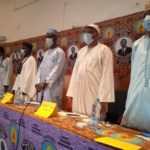Lawmakers, members of gover-nment and road safety stakeholders have agreed that in spite of the marked decrease in deaths caused by accidents on the country’s roads, more still needs to be done.
The remarks were raised during a special plenary sitting of the National Assembly on March 23, 2021, chaired by the First Vice President of the Chamber, Hilarion Etong. Road safety is a national cause going by the legal, economic, financial, health and social impacts involved. Welcoming all to the sitting, the president of the Parliamentary Network for Road Safety (LEGIS-SECU-ROUTE) Hon. Donald Malomba Esembe noted that road accidents are the first cause of death in Cameroonian youths. He said, “We need to stop death on our roads before death stops us”. Cognisant of the knowledge gained in workshops attended by members of the network he heads, he highlighted that is was a matter of urgency for all to collaborate in order to generate the expected change on the nation’s roads.
For his part, Hon. Hilarion did a rundown of recent accidents that claimed the lives of several Cameroonians on some highways amongst them, the late Hon Harouna Bougue Abdoulaye last July 2020. Faced with the disheartening losses incurred – human, material and financial due to accidents, he declared the Chamber’s readiness to support every action aligned with limiting the rate of road accidents.
According to statistics from the Ministry of Transport, between 2011 and 2019, the number of deaths recorded in road accidents has dropped from 1588 to 627 giving a percentage of 60- a significant drop. Minister Ngalle Bibehe gave a state of affairs of the situation in Cameroon, and made it known that while high speed is to blame for 35percent of accidents on the country’s roads, the state of cars accounted for 17percent. Other causes include drunkenness and state of roads. As part of measures put in place by the Ministry of Transport, is the systematic removal of obstacles on major roads while carrying out audit missions and updating road signs to global norms to name but these is being envisaged. In similar reports made by the Ministers of Public Works, Health, Justice and the Gendarmerie, the members of government all outlined what is being done by their ministries to curb the scourge also spelling out sanctions reserved for faulty road users.
Following concerns raised by MPs with regards to lapses in the road safety fight, adequate responses were provided. At the close of discussions that were geared towards seeking a common path to improve the issue at hand, a list of recommendations were arrived at in the domains of policy making, legislation and administration. As much as it is important to assist families of victims, it was equally deigned utmost to step up education and sensitization as well as punish those who do not comply with set rules.
Claudette CHIN





